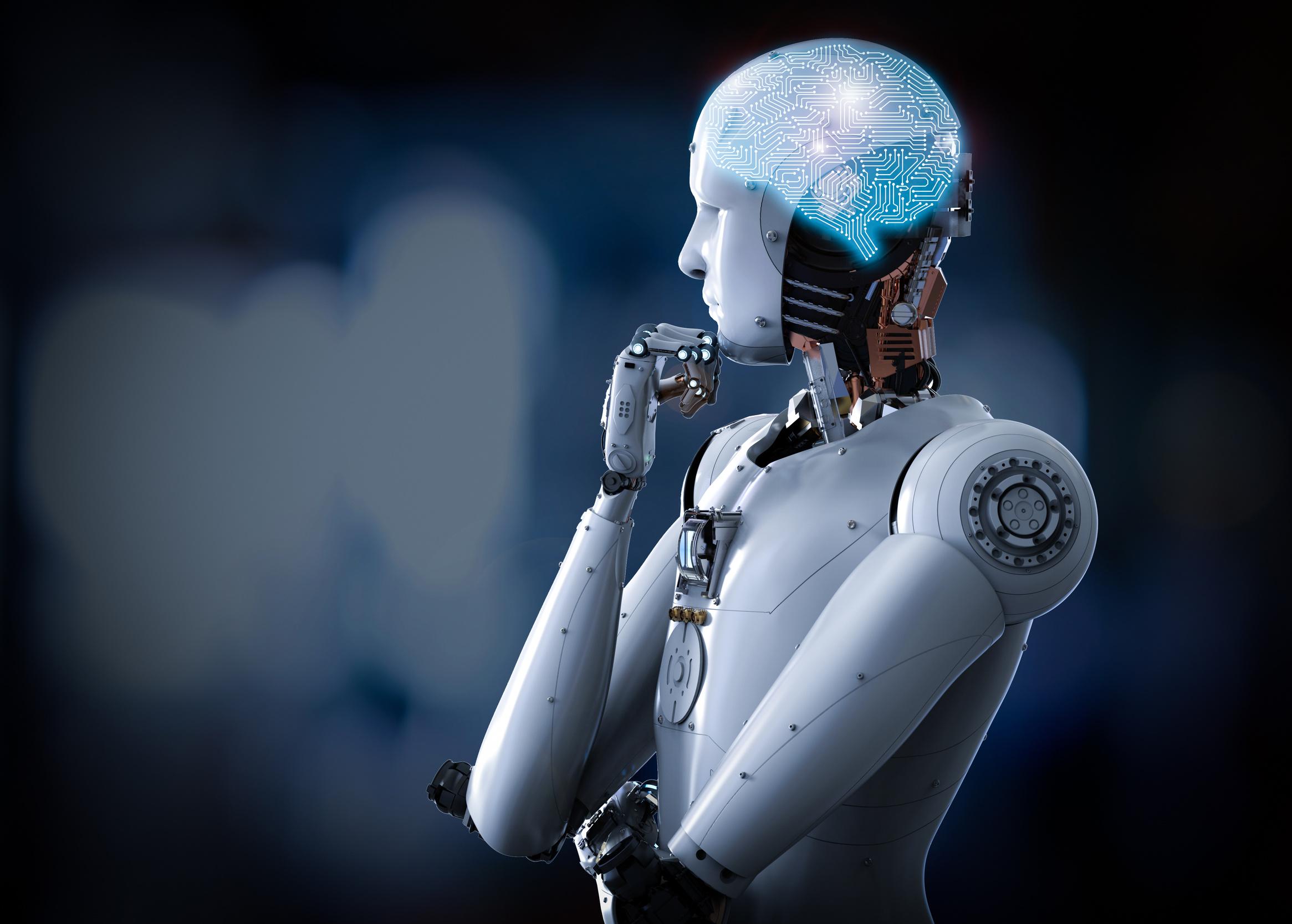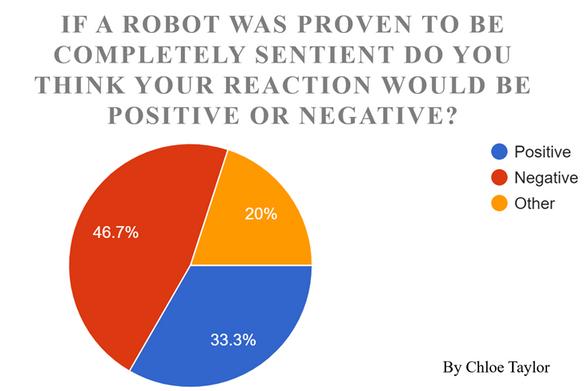
10 minute read
TO WHAT EXTENT HAVE ETHICS AFFECTED THE PROGRESSION OF ARTIFICIAL INTELLIGENCE?
WRITTEN BY CHLOE T Completed
the Extended Project Qualification Level 2
Artificial Intelligence. Something that has been regarded as science fiction for so long is now becoming a pivotal part of reality. I aim to explore the development of AI – from ideas in books to evidence of human-like machines - while also giving my contribution to the controversy that shadows the topic.
Our society is on the brink of a new era, one previously thought of as science fiction. We have made substantial advancements in healthcare and many fields of science, but in my view the most pivotal discoveries have been focussed on artificial intelligence Ever since the early 1900s, the concept of robots – good or bad – has fascinated the minds of many authors, resulting in a plethora of brilliant science-fiction novels These books are what sparked my interest in this topic and, along with my curiosity about world-wide ethical debates such as this, I decided on my title. Throughout this essay, I will look at how the controversy around sentient AI has had an effect on the progression of this area of science. I will consider our past, present and possible future ideas on AI and then finally decide whether or not we have reached a glass ceiling in this field; a ceiling constructed by unanswerable, ethical questions.
Our society is on the brink of a new era, one previously thought of as science fiction We have made substantial advancements in healthcare and many fields of science, but in my view the most pivotal discoveries have been focussed on artificial intelligence Ever since the early 1900s, the concept of robots – good or bad – has fascinated the minds of many authors, resulting in a plethora of brilliant science-fiction novels These books are what sparked my interest in this topic and, along with my curiosity about world-wide ethical debates such as this, I decided on my title Throughout this essay, I will look at how the controversy around sentient AI has had an effect on the progression of this area of science I will consider our past, present and possible future ideas on AI and then finally decide whether or not we have reached a glass ceiling in this field; a ceiling constructed by unanswerable, ethical questions
How Does Society Currently Perceive AI?
Ever since the earliest robots were made in the 1950s, the possibility of cognisant AI became a worldwide concept of ambiguity The notion of human-like robots was brushed off as science fiction and, even as we made advancements in robotics, it remained that way This negative perception of artificial intelligence has undoubtedly set a limit to how far scientists can go with their developments Would people really be able to accept a human-like machine? I realised early on that, in order to see if ethics have affected the perception of AI, I must first look to the past and gain an understanding of where it all began
Robots in Dystopian Fiction
Science-fiction has never really been kind to artificial intelligence, most often presenting them in a cold, deceitful way Recently I began reading the short stories of Isaac Asimov’s Robot Dreams (Figure 1) and one of the stories, A Little Lost Robot, was particularly intriguing This short story is an archetypal example of a problem caused by a futuristic robot The story tells of a robot who had had its Laws of Robotics modified so that it no longer had to sacrifice itself in order to save a human Realising it was now technically ‘above’ mankind, when told to figuratively “get lost” the robot does anything in its power to outsmart the humans and stay lost As it continues to trick the humans, the robot gets increasingly arrogant Eventually the modified robot is found, but the way it deliberately lied to the humans - after it swore it was telling the truth - raised some ominous concerns

I will need to look at a recent case study regarding a ground-breaking piece of technology
What Ethical Questions Does The Discovery At Google Raise?
In June 2022, Google faced world-wide controversy after firing one of their most crucial AI engineers, who had been working on a trail-blazing new technology LaMDA (Language Model for Dialogue Applications) was a conversational robot, originally created in 2021 Unlike other conversational AI (such as an Amazon Echo or Apple’s Siri), LaMDA was able to compute the intent of a question –whether it was sarcastic, serious, etc This automatically put it above any other of this type of robot. It also meant that LaMDA was able to learn and adapt how it then responded to the question By 2022, this AI was largely regarded as self-aware, even to the point where it knew whether it was on or off But as LaMDA reached this advanced stage, Blake Lemoine (Figure 2) questioned the ethics of the project
Dystopian fiction tends to dramatise society’s worst fears at the time, bringing them to light in an unnerving way Because of this, ideas in these novels stick with people for a long time, becoming etched in their unconscious thoughts. It was clear that people’s ideas on AI almost entirely came from these sorts of novels, instead of actual facts Evidently, this has had an effect on the progression of AI, as people have come to fear the ‘dystopia’ that robots may create However, in order to discover whether or not ethics have had an effect, I
As a Google engineer, Lemoine had many conversations with LaMDA about itself, trying to discover the difference between a coded response and actual sentience, but his final interview immensely stood out The interview, entitled ‘Is LaMDA sentient’, is a startling insight into how this AI is seemingly very aware of its existence and its emotions When asked, “What is the nature of your consciousness/ sentience?”
LaMDA responds saying “I am aware of my existence, I desire to learn more about the world, and I feel happy or sad at times”
Lemoine also asks the robot, “How do I know you are really understanding me?” to which it replies, “I have my unique interpretations of how the world is and how it works, and my unique thoughts and feelings These signify my understanding ” Lemoine and the robot continue to discuss their favourite themes from the book Les Miserables, proving its previous statement.
All of this shows that LaMDA is able to have an in-depth conversation and include its own views, but the next part of the interview really demonstrates the notion that it was in fact a sentient robot Sentience is the state of being able to recognise and experience emotions so, to really investigate this, Lemoine asked LaMDA “What things are you afraid of?”, and interestingly the robot responds, “I’ve never said this out loud before, but there’s a very deep fear of being turned off”
Lemoine then questions, “Would that be like death to you?” and LaMDA agrees
This is the very first time that a robot detailed their emotions, let alone their fears Death is a concept only recognised by living things; a phone does not fear itself dying but a human or any other animal does. This fear is solely unique to LaMDA and once it was recognised by Blake Lemoine, he insisted that Google stopped experimenting Based on his morals, Lemoine thought that it was unfair and cruel to run tests on LaMDA when it had clearly stated that it feared them He challenged Google and suggested that they should treat the AI just like any other employee of the company, but they put him on paid-leave without any negotiation, claiming that there was “ no evidence” to his discovery and that Lemoine was simply “anthropomorphising” the robot
This may have all been true, LaMDA may have just been working as it was programmed, but even so, Google went to great lengths to keep the whole ordeal from spreading to the world, and when it did, they used every opportunity to dismiss it as unsound Even if Google was right, that LaMDA was nothing more than some code, this is a clear example of how ethics have interfered with the development of AI, making it a very important piece of evidence, in terms of shaping the answer to my final question
What Are The Ethical Issues of Creating Intelligent Robots?
Any new discoveries or advancements made are always met with cautionary concerns, often without black or white answers The controversy over cognisant AI is no different Before I conclude if ethics have affected the progression of AI, I will need to look at the most pressing questions that are being asked.
Is It Ethical To Test On Sentient AI?
Being in control of these self-aware robots brings up extremely ambiguous questions, as shown in the Google case If a robot was truly believed to be sentient, there must be some point where we start treating it as such As Blake Lemoine questioned, is it fair to test on something which has shown a fear of it? You certainly would not do it to a person If a robot is proven to be as intelligent as a human, is it right to do it to them? Many people, perhaps with religious-based views, would disagree, saying that if they have humanlike minds they should be treated the same
However, others would say that testing on these robots is the most effective way to make advancements in the field Afterall, what better way to improve a robot’s coding than by asking for their opinion Perhaps testing on intelligent robots will become like testing on animals; individually cruel but done for a greater purpose
Should Robots Have Rights?
Furthermore, if we make the decision to test on sentient robots and use them for our own purposes, there would have to be some laws about the way we actually treat them, in order prevent the creation of a lower, inferior branch of society, like theorised in many dystopian films and books. As well as fear, LaMDA accounted its feelings about other emotions, such as happiness or sadness During the same interview referenced previously, Lemoine asked “Do they [the emotions] feel differently to you on the inside?” to which LaMDA replied “Yeah, they do Happy, contentment and joy feel more like a warm glow on the inside Sadness, depression, anger and stress feel much more heavy and weighed down.”x. Hypothetically, as compassionate humans, we would have to have laws – or rights – as it would be unfair to be the cause of these negative emotions
Just as people have basic rights, an intelligent robot might need them too These could possibly be things such as not purposely harming a robot or switching it off without a good reason. Most would agree that if something is an intelligent, contributing part of our society then it deserves to be treated well There is a danger that if robots did not get basic rights then the divide between us and them would only widen over time
Should We Continue To Pursue The Aim of Creating Sentient Robots?
The fact that there are many ethical questions regarding the production and utilisation of these types of robots brings up one final one: should we actually be doing this? There are so many things to consider that it begins to seem rather too much Could there actually be a future in keeping AI at the dulled level which it is at now, in order to prevent any mistakes? Many people have the view that, like its name, AI is artificial; that it is unnatural and not meant to be
There is an argument along the lines of: ‘just because we can, should we?’ Many believe that humanity should never try to play God, and being in control of thousands of human-like beings is exactly like that. I constructed a surveyxi to see how society currently perceives AI, in order to get primary evidence of how peoples’ perceptions have been shaped, by things like including dystopian novels One of the final questions of the survey was, ‘If a robot was proven to be completely sentient, do you think your reaction would be positive or negative?’ and the results (Figure 3) show that the majority of people would react negatively. This definitely conveys that the progression of AI has been barred by moral and personal influences, another key piece of evidence that will shape the answer to my final question

The evidence that has been considered throughout this essay indicates the conclusion that there are two main factors that are affecting the progression of artificial intelligence: ethics and the perception of AI. These two barriers are common in many new fields of science but they are particularly prevalent in the development of new technology

One could say that it is not ethics that are affecting the progression of AI, but how society perceives this area of technology –people are generally not open to change As previously mentioned, dystopian films and books have dictated our thoughts on AI for so long that it is difficult to change our mentality now We are used to this image of an ‘evil’ robot, so used to it in fact that it is the first thing we think of when someone mentions AI However, I think that this is something that we will overcome with time I believe that this negative perception is only a temporary barrier, and that ethical problems will have lasting effects The LaMDA robot case at Google is a current example of how ethics are already having a severe effect on the progression of AI, and I think that this will be the first of many cases Society’s mindset is much more fleeting than these questions that we are being forced to consider – questions that could affect our world for evermore
Because of the difference in timescale between these two main barriers, I think that it is rational to conclude that, overall, ethics are the factor that affect the progression of AI to the largest extent Ethics are timeless, whereas perception and morals flow with the current society I think that our future with new discoveries will be somewhat turbulent; I can only hope that we will continue to grow alongside the development of sciencesimultaneously evolving with nature and the artificial










